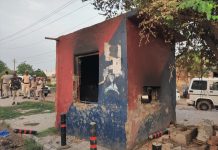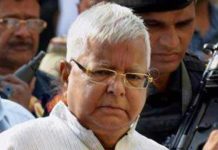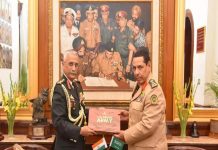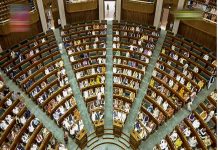The grandparents of Rishi and Humza had migrated from their homeland, just a few decades ago. So, the duo seems to aware of the ordeals of the partition. Therefore, they are using their respective positions for retaining the unity of Britain
The British imperialists had arrived through the sea-coast and later expanded their territories in the rest of India. It, perhaps, was for the first time that the invader had chosen the sea-route to subjugate India instead of coming via the traditional Khyber Pass in the north.
The British had established their capital in Kolkata, but the colonial rulers, asserting themselves under the banner of the East India Company (EIC), did not lower their vigil regarding the northern borders. They did not commit atrocities like other invaders from the north, but subjugated the people of the Indian sub-continent for financial gains, and the Punjab was to be focused for strategic purposes.

The EIC deliberately penetrated in the social and religious affairs of the vast Indian lands for ensuring financial gains, and for this they introduced westernized administrative and military systems. During the interregnum between the final assertions of the British power in Delhi during the 19th century, the Punjab had enjoyed better governance than the rest of India. The idealism of Sikhism had strengthened the mosaic of the social and religious fibre of the people irrespective of their personal faith, whether they adhered to the traditional Hinduism or Islam. During the reign of Maharaja Ranjit Singh, the Punjabis had further developed liberal world-view irrespective of their faith.
Interestingly, this liberal attitude has survived in spite of India’s two centuries of tumultuous history and her unnatural partition on religious lines. It is reflected in the recent policies of the prime ministers of the U.K. and Scotland. They hail from Punjab, they follow different religions, yet they are for keeping the U.K. united. They have become the symbol of British unity, protecting the fragile future of the United Kingdom (UK) comprising England, Scotland, Wales and Ireland. The unity of the erstwhile colonial power is in the hands of the two prominent British leaders of Indian origin, PM Rishi Sunak, and the new PM of Scotland Humza Yousaf, who belong to the Punjab, now a part of Pakistan. Humza took over as the new Scotland PM recently on March 29 this year.
The grandparents of Rishi and Humza had migrated out from their homeland, just a few decades ago. They appear to be quite aware of the ordeals of the partition. Therefore, it is not surprising that they are using their respective positions for retaining the unity of Britain, perhaps, condoning its erstwhile rulers for partitioning their home land, India, in 1947.
History’s Sweet Revenge
History has its own ways to settle scores with the repressive regimes, sometimes taking sweet revenges. During the mid-forties of the 20th century, the British, the outgoing colonial power from India, was busy in carving out the partition of the country for serving their future strategic interests, especially during the post-WWII years, in the region. Its policy had nearly decimated the Punjab and its plural cultural traditions, when its people indulged in unprecedented fratricide in the name of religion, but its soul and the spirit of surviving against all possible odds could not be crushed. Its rise is phenomenal like a Sphinx. In Egyptian mythology, the sphinx is typically depicted as a man with the lion’s body and being depicted as benevolent. It is reflected in the attitude of the two leaders, who do not want to be vindictive, are keen to save the U.K. from fragmentation.
It may be noted that Humza Haroon Yousaf’s father Mian Muzaffar was born in Mian Channu. Similarly, Rishi Sunak’s grandparents came from Gujranwala. These areas are now in Pakistan, and the distance between them is estimated to be just 258 kilometres.
During the tumultuous months of 1946-47, Hindu-Muslim riots were engineered across Northern India, ultimately forcing the Congress Party under Nehru, Gandhi and Patel to concede Pakistan. Amidst the depressing violence, India’s first PM, Jawaharlal Nehru, told the nation on the midnight of August 14-15, 1947 that after centuries of repression, a new India now begins her journey as a new nation with an ancient glorious past , thus indeed a ‘tryst with destiny’ had begun 75 years ago.
Indians in US Politics
It is believed that if Nikki Haley does not get the Republican nomination for the presidency in 2024, she, like the present US vice-president, Kamala Devi Harris, might be chosen as the vice-president, if a Republican is chosen as the new president. Since the former US president, Donald Trump has been indicted, and if he could not get himself cleared from the criminal charges before the New York court, Nikki might get the nomination for the top post, a first Indian-American, to contest, or perhaps lead the world’s most powerful political position.
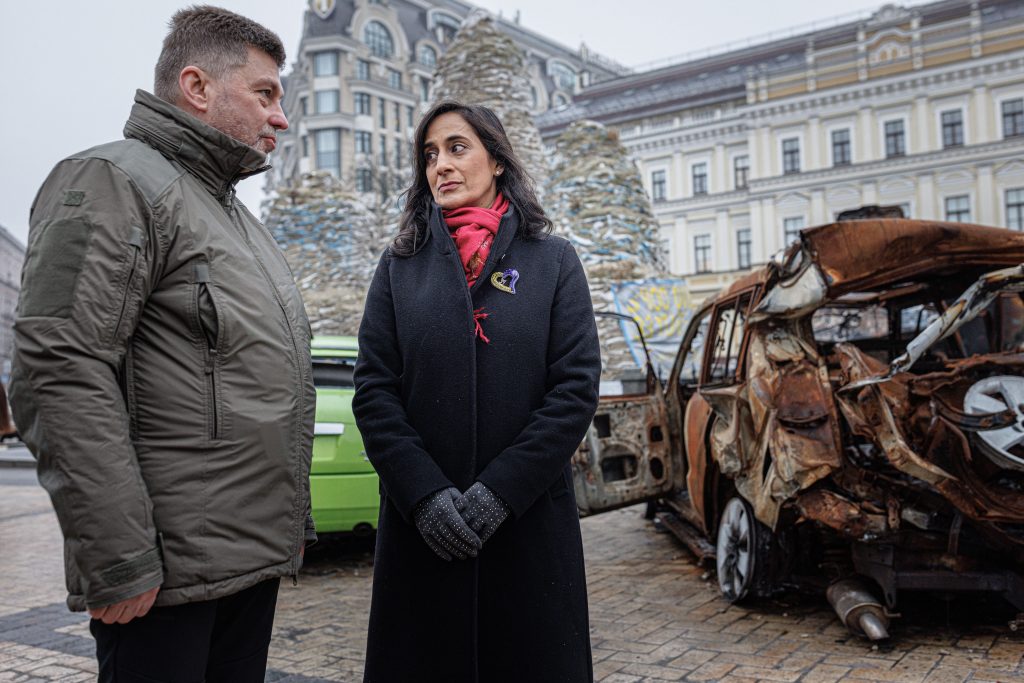
The Indians, especially a large number of Punjabis, occupy key positions in the White House or at the Capitol and even in top American companies; irrespective which party wins the polls. President Joe Biden has appointed Ajay Banga to preside over the World Bank. Most of us are already aware of the big names in the corporate world such as Jatya Nandella, Sundar Pichai, and many known and not so known successful Indians in the corporate, Information Technology and now even in public affairs.
Interestingly, the Indians enjoy rare confidence of the American political establishment. Aparna Mathur, an economic adviser to the White House during the Trump administration was asked by President Joe Biden to continue as long as she wishes to be with the new administration. She served under the new administration before joining Harvard University as a professor.
The incumbent Kama Devi Haris has become a living legend as the first woman vice-president, and thus holding the highest-ranking female official in US history. She also represents a complex racial cocktail; she is not only the first African-American, her father being a Jamaican, she is also the first Asian-American as her mother had hailed from India. Yet, she reaches the pinnacle of the power structure in a country, where racial discrimination often flares up. Earlier, as a member of the ruling Democratic Party, she had successfully represented California in the US Senate during 2017-2021.
With their phenomenal success and recognition of their talent, it is not surprising that another Indian woman, Nikki Haley, daughter of a couple from Amritsar, Punjab, Ajit Singh Randhawa, an agriculture scientist, and Raj Kaur, a law graduate from the Delhi University, has announced to contest the 2024 Presidential poll as a Republican. The decision of Nimrat Nikki Randhawa, popularly known as Nikki Haley, shows the dynamism of the Indians, especially Punjabis, across the Atlantic. Her intention to contest the 2024 US Presidential Poll did not surprise anyone in US politics. She had already served as the youngest governor of the South Carolina state and also the first woman to adore the high office. During the tenure of President Donald Trump, she also served as the US ambassador to the United Nations.
The story of Rohit Khanna, 47, born to Punjabi parents, father an IITian and mother a school teacher, is now one of the new generation Democratic Party leaders. He is among the few progressive capitalists among the six members of the House of Representatives, who do not accept political donations from corporate or the Political Action Committee. Before being elected to the House of Representatives from California, he had also served in the Obama administration as the deputy assistant secretary, Commerce. His family is also closely related to India’s freedom movement. His maternal grandfather, Amarnath Vidyalankar, was from the Bhera city of Sargodha district of Punjab, now in Pakistan, and was a close associate of Lala Lajpat Rai.
Anita Anand visits Ukraine
Canada’s Defence Minister Anita Anand, a daring charming woman at 56 and the daughter of an Indian couple, mother, Saroj, an anaesthesiologist from Punjab, and father a surgeon from Tamil Nadu, visited Kyiv, Ukraine, amidst the deadly missile attacks and gun fires on January 18 this year. Her daring act reinvigorates the war efforts of this war-torn country. Her visit was the part of the additional 500 million dollar military aid committed to Ukraine. A Ukrainian couple, who is serving as a faculty in India, recently confided to this author that Indian women are really daring. The myth of European superiority appears to have been on decline, if not totally wiped out.
Eight years ago in the 2015 elections in Canada, Indian Canadians won a record nineteen seats in Parliament. It was double the number of seats that they had held in the previous House. Of the nineteen members of parliament, eighteen members trace their origins to the state of Punjab in India.
Some of the prominent Indian origin members of parliament as well as the cabinet are Harjit Sajjan, who had held the defence portfolio, Amarjeet Sohi, Minister of Infrastructure and Communities, Navdeep Bains, Minister for Innovation, Science and Economic Development, and Bardish Chagger, Minister of Small Business and Tourism.
Punjab – the gateway to India
The Punjab being the gateway to India, had been protecting India, the most prosperous nation of the world for centuries, but it has had the history of prolonged sufferings. Being the frontline border region, it had been facing aggressions since the invasion of Alexander. The last assault on its vibrant people came from the outgoing British imperialists in 1947, when the colonial power got it partitioned in the name of the religion. The traditional Sanatan Dharma, Sikhism, Islam and Sufi cults had formed a strong mosaic of the culture of Punjab.
During WWI and WWII, the colonial power had used the brave people of the region as the cannon fodder, and before leaving India, it unleashed the communal virus, basically aimed at destroying India, but severely hurting the culture and language of the people of the Punjab. Nearly a century before the partition in 1947, according to the British archives, the British proxies were bribing the Muslim clergies to spread communal violence by speaking against Hindus, Sikhs and Russians during the Friday sermons in each mosque. Yet these efforts could not really fragment the well-knit social fabric of the region.
There were few takers for Pakistan during 1940s, but in a bid to support, its crony, Muhammad Ali Jinnah, for partitioning India, the British had hired paid goons and clergies from the Hindi heartland for convincing the predominant Muslim population of the Punjab and Pakhtoons to support a separate homeland for the Muslims. The colonial power also bribed the Communist Party of India (CPI) for obtaining its support for Pakistan. The CPI was so loyal to the British deep state, MI-5, that it called Mahatma Gandhi and Jawaharlal Nehru as reactionaries and Jinnah a progressive leader.
India was partitioned, but in the Pakistani Punjab, the Islamic zealots from UP, who had been on the forefront for the creation of Pakistan, successfully wiped out the Punjabi language. In the Punjab provincial assembly, if any member ever dared to speak in Punjabi, the speaker would be fined for using the language of Hindus i.e. Punjabi! The same restrictions were imposed on its Bengali population, but they refused to succumb to this pressure in the name of Islam and seceded as Bangladesh in 1971.








